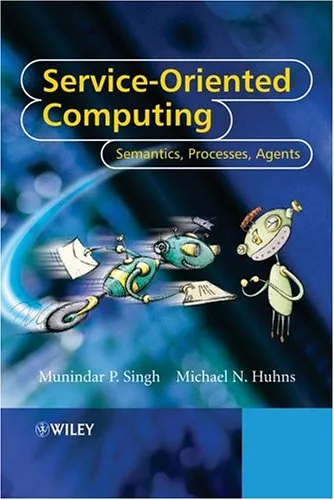Service-Oriented Computing: Semantics, Processes, Agents
4.0
Reviews from our users

You Can Ask your questions from this book's AI after Login
Each download or ask from book AI costs 2 points. To earn more free points, please visit the Points Guide Page and complete some valuable actions.Introduction: Service-Oriented Computing: Semantics, Processes, Agents
In an ever-evolving digital landscape, the integration and collaboration of software systems demand innovative paradigms. Service-Oriented Computing: Semantics, Processes, Agents, by Munindar P. Singh and Michael N. Huhns, offers a comprehensive exploration of Service-Oriented Computing (SOC), integrating multiple interdisciplinary perspectives to present a unified framework for understanding modern, distributed systems.
This book stands as a cornerstone for students, professionals, and researchers alike who are looking to master the profound principles and practices that underpin SOC. The authors delve deep into the semantics, processes, and agent-based approaches that enable seamless cooperation among distributed entities, making their treatment of the subject both practical and deeply insightful.
A Detailed Summary of the Book
Divided into carefully structured chapters, the book presents a progressive narrative covering the fundamental concepts, essential technologies, and advanced topics in Service-Oriented Computing. The authors emphasize the importance of understanding both theory and implementation, bridging the gap between conceptual models and real-world applications.
The book begins with an overview of the SOC paradigm, distinguishing it from traditional, monolithic computing approaches. It explains how services, as autonomous, loosely coupled entities, are the building blocks of modern distributed systems. The text transitions into an exploration of key principles such as interoperability, modularity, and composability, foundational to the design of scalable systems.
A unique strength of this book is its focus on semantics, which ensures that machines understand service descriptions as intended. The integration of process models and workflows provides readers with necessary tools to design, execute, and manage service-oriented applications effectively. Additionally, the authors introduce agent-based approaches, offering insights into intelligent, autonomous systems that can dynamically reason and negotiate within complex environments.
The book is enriched with real-world examples, case studies, and pragmatic best practices, making it equally beneficial to academics and practitioners. By the end, readers are equipped with advanced techniques to implement SOC solutions in domains ranging from e-commerce to enterprise software and beyond.
Key Takeaways
- A profound understanding of Service-Oriented Architecture (SOA) principles and their practical significance.
- Comprehensive knowledge of process modeling and workflows in distributed environments.
- The role of semantics in ensuring effective communication and interoperability among services.
- Insights into agent-based systems for realizing intelligent and adaptive applications.
- Best practices and methodologies for implementing robust service-oriented solutions.
Famous Quotes from the Book
"A service is not just software — it is a capability that fulfills a specific purpose, designed to interoperate seamlessly with other capabilities."
"Semantics is not a luxury; it is the key to building systems that understand and interact in a meaningful way."
"Service-oriented computing isn't just a methodology—it's a paradigm shift that builds synergy between processes, data, and logic."
Why This Book Matters
In a world increasingly fueled by digital transformation, understanding how distributed systems operate is no longer optional—it is critical. This book bridges the knowledge gap for those aiming to navigate fields like cloud computing, IoT, and AI-driven applications, where SOC principles reign supreme. It matters because it empowers readers to design systems that are inherently flexible, reusable, and scalable.
Furthermore, Service-Oriented Computing: Semantics, Processes, Agents is an essential resource for fostering cross-disciplinary understanding. The synthesis of semantics, processes, and agents creates a holistic perspective for tackling complex challenges in system design. This ensures readers not only keep up with emerging technologies but also contribute to reshaping the computing paradigm.
Whether you're a seasoned engineer or an academically inclined researcher, this book will deepen your understanding of SOC concepts and ignite innovative solutions to tomorrow's computing demands.
Free Direct Download
You Can Download this book after Login
Accessing books through legal platforms and public libraries not only supports the rights of authors and publishers but also contributes to the sustainability of reading culture. Before downloading, please take a moment to consider these options.
Find this book on other platforms:
WorldCat helps you find books in libraries worldwide.
See ratings, reviews, and discussions on Goodreads.
Find and buy rare or used books on AbeBooks.


